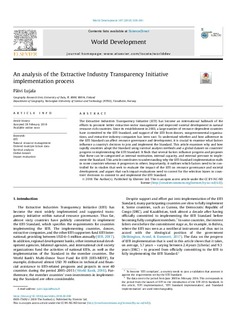| dc.contributor.author | Lujala, Päivi | |
| dc.date.accessioned | 2018-09-05T11:24:26Z | |
| dc.date.available | 2018-09-05T11:24:26Z | |
| dc.date.created | 2018-08-16T14:24:02Z | |
| dc.date.issued | 2018 | |
| dc.identifier.citation | World Development. 2018, 107 (July), 358-381. | nb_NO |
| dc.identifier.issn | 0305-750X | |
| dc.identifier.uri | http://hdl.handle.net/11250/2560942 | |
| dc.description.abstract | The Extractive Industries Transparency Initiative (EITI) has become an international hallmark of the efforts to promote better extractive-sector management and improved societal development in natural resource-rich countries. Since its establishment in 2003, a large number of resource-dependent countries have committed to the EITI Standard, and support of the EITI from donors, nongovernmental organizations, and extractive industry companies has been vast. To understand whether and how adherence to the EITI Standard can affect resource governance and development, it is crucial to examine what factors influence a country’s decision to join and implement the Standard. This article examines why and how rapidly countries adopt the Standard using survival analysis methods and a global dataset on countries’ progress in implementing the EITI Standard. It finds that several factors influence progress and proposes that these can be categorized as internal motivation, internal capacity, and external pressure to implement the Standard. This article contributes to understanding why the EITI Standard implementation stalls in some countries whereas it progresses in others. Importantly, it outlines which factors need to be controlled for in studies that seek to evaluate the impact of the EITI on resource governance and societal development, and argues that such impact evaluations need to correct for the selection biases in countries’ decisions to commit to and implement the EITI Standard. | nb_NO |
| dc.language.iso | eng | nb_NO |
| dc.publisher | Elsevier | nb_NO |
| dc.rights | Attribution-NonCommercial-NoDerivatives 4.0 Internasjonal | * |
| dc.rights.uri | http://creativecommons.org/licenses/by-nc-nd/4.0/deed.no | * |
| dc.title | An analysis of the Extractive Industries Transparency Initiative implementation process | nb_NO |
| dc.type | Journal article | nb_NO |
| dc.type | Peer reviewed | nb_NO |
| dc.description.version | publishedVersion | nb_NO |
| dc.source.pagenumber | 358-381 | nb_NO |
| dc.source.volume | 107 | nb_NO |
| dc.source.journal | World Development | nb_NO |
| dc.source.issue | July | nb_NO |
| dc.identifier.doi | 10.1016/j.worlddev.2018.02.030 | |
| dc.identifier.cristin | 1602454 | |
| dc.description.localcode | © 2018 The Author(s). Published by Elsevier Ltd. This is an open access article under the CC BY-NC-ND license (http://creativecommons.org/licenses/by-nc-nd/4.0/) | nb_NO |
| cristin.unitcode | 194,67,10,0 | |
| cristin.unitname | Institutt for geografi | |
| cristin.ispublished | true | |
| cristin.fulltext | original | |
| cristin.qualitycode | 2 | |

